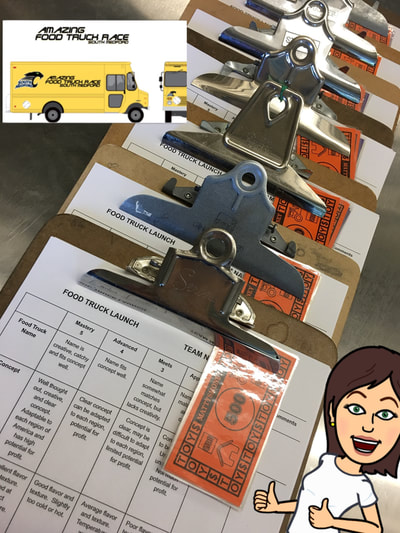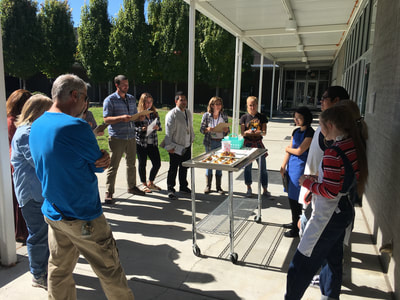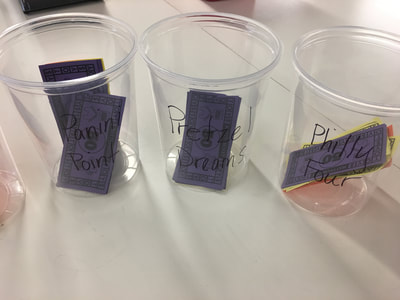 This week I was sharing with someone in my PLN about how I gamify my culinary classes via Voxer. As I was describing my classes, I shared an aspect of my game that I recently realized wasn't working well and explained how I was going to change it. After I shared, he said something that really resonated, " I appreciate that you shared about your pitfalls. Hearing how things don't work is just as important as hearing how everything is wildly successful." This statement really resonated with me. So often as educators we are eager to share all that is going on that's awesome, but rarely do we share the things that didn't work. The problem with this is that when we glimpse into classrooms on social media and see all the awesome, we sometimes forget there is a lot that happens in those classrooms that is less than stellar. Every teacher has bad days. In the midst of epic successes, there are also epic fails. We all have days where we are discouraged, frustrated, and less than inspired. We talk about the importance of taking risks and the value of failure, but how often do we really share about it. Observing things that aren't going right in a colleague or PLN's classroom, is sometimes more encouraging to me than seeing things that are. It makes me feel normal, realizing that the people I follow and admire are just like me.....human. It's like going over to someone's house for dinner and finding their house less than perfect. If they have a pile of laundry on the couch or a stack of mail on the counter, it makes me relax and realize that not only is it okay to not having everything perfectly in place, but that they feel comfortable enough with me to be real. I am much more likely to invite that person over for dinner knowing that it would be okay if I had a pile of laundry on the couch too. As innovative educators, we are all taking leaps and pushing boundaries sometimes with huge success, sometimes with failure. None the less, we keep pushing forward and breaking down barriers to bring the very best teaching and learning to the classroom. My most recent failure happened in Culinary 3 during our Food Truck Launch. We invited staff in as "investors" to listen to food truck teams launch their concepts and taste their signature dishes. As investors came in the door, I handed them a clipboard with evaluation rubrics and $2000 of play money. Students had stations set up outside with their signature dishes, Ipads holding their promotional video trailers or presentations, and a container to hold the money that investors would be be allocating to the teams that they felt were most deserving. Investors went around listening to each team's pitches and tasting their delicious dishes as they evaluated on the rubrics leaving valuable feedback. Being our first challenge, students were late getting their dishes out which made the end of the period rushed. After the last team presented, staff hurriedly allocated their $2000 to the teams they felt most deserving. The money that each team earned would be the seed money that launched our Food Trucks on a race across the United States to learn about regional cuisine. So here lies the problem. As I was counting the money and reading the feedback from the judges, I realized that the money allocations didn't necessarily match up to the point totals on the rubric. The rankings for all but the top two teams were different. I had to make a judgement call. Would I stick with the original plan of using the currency to determine the team's ranking, or the tallied scores on the rubrics instead. 5 minutes before the next class began I was still unsure of how to handle the situation. I then realized it was silly to keep stressing about this situation, I needed to involve the students in the problem solving process. As students came in, I explained the dilemma and opened up a discussion. Within just a few minutes it was clear what needed to be done. I would eliminate the currency and base the team's ranking on the rubric scores. I immediately felt good about the decision because the teams were all in agreement. Additionally, students appreciated the fact that I made the decision with them. I loved the idea of allocating currency, but the reality was it didn't work. I had to let it go. It made me think about how often I hold on to things just because I really wanted the idea to work. Rarely do I share my struggle in my writing or with my amazing PLN who could help me problem solve. Additionally, I so often wrestle with how to fix failed ideas without asking the students to help me come up with solutions? Let's share our wins, but let's also share our fails. It may be just what someone needs to realize they are not alone.
1 Comment
10/21/2017 04:06:39 pm
I love this! I one time spent days setting up a scavenger hunt..... only to have it dead end after 2 clues..... got it going again but it was an epic fail on my part! I want to start sharing this idea with students as well. Celebrate the failures as well as the successes! I'm toying with the idea of an epic fail board in class where we post our "best" fails of the week and come together on Fantastic Failure Friday to celebrate them together..... thanks for sharing your failures and for the record I'm typing this from my couch with a pile of laundry at the end!
Reply
Your comment will be posted after it is approved.
Leave a Reply. |
Tisha RichmondStudent Engagement & PD Specialist in Southern Oregon, Canva Learning Consultant, Canva Education Creator, and author of Make Learning Magical. I'm passionate about finding innovative ways to transform teaching and create unforgettable experiences in the classroom. |
- HOME
- SPEAKING
- ABOUT ME
- BLOG
-
RESOURCES
- Memorable Beginnings >
- Authenticity & Agency
-
Gamified Experiences
>
- Anywhere Learning Plans
- The Amazing Race Game Plan Resources
- The Race to the Golden Ticket
- Ready Player One
- The Amazing Food Truck Race
- The Great Interior Design Challenge
- The Final Table Challenge
- Challenge Rubrics
- Challenge Ideas
- Kitchen Utensil Race & Other Variations
- Code Names for the Classroom
- Badges
- Innovation
- Creativity, Curiosity, and Collaboration
- Authentic Audience
- Legacy
- Make Learning Magical Book
- PODCAST
- T-SHIRTS
- YOUTUBE
-
RECIPES
- Workshop & Session Resources
- Dragon Smart Reviews
Proudly powered by Weebly






 RSS Feed
RSS Feed